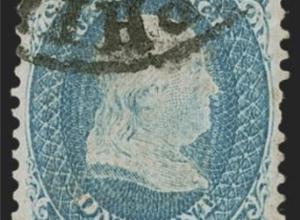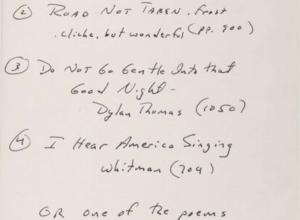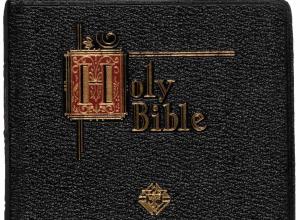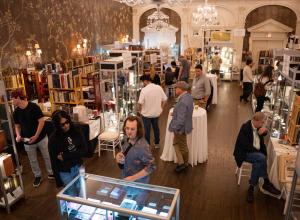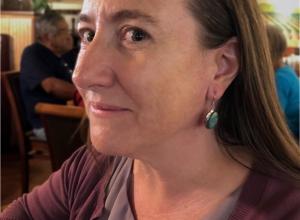Guest Blog: Recollections of a Providential Bibliohaven
Recollections of a Providential Bibliohaven
Guest Blog by FB&C reader, Martin J. Murphy of Richmond, Virginia
Nick Mamatas' recent article in Fine Books Magazine about H.P. Lovecraft and Providence, Rhode Island, struck many chords with me. Both the city and the writer figure prominently in my life as a reader, book collector, and incurable biblioromantic.
While I was a student at Brown University in the early 1970's, I shared Lovecraft's fascination with the peculiar character of College Hill, which remains today a remarkable time capsule of New England architecture and ambience, spanning three centuries. I was introduced to his writing while I was there, and promptly fused his atmospheric storytelling with my own experiences of that singular, mysterious, and slightly haunted neighborhood. Lovecraft loved the character of old Providence and wove it deeply into his stories, where detailed descriptions of the neighborhood streets, buildings, odors, and atmosphere run throughout. That, in turn, allows one to walk those streets, still very much as described in tales such as "The Case of Charles Dexter Ward", and pass directly into the stories themselves. Strolling along Benefit Street on a moonlit night is engaging enough; gazing up at The Shunned House at midnight, imagining its dark and sepulchral cellar secrets, bumps the experience up to a whole new level.
Providence has further claims to a bookishly gothic character, having briefly been host to Edgar Allen Poe. Local lore says that Poe courted poet Sarah Whitman in amongst the headstones of St John's Church, just below Benefit Street, next door to Sarah's family home. True or not, that legend has been enough to make the graveyard a regular haunt for like-minded readers of Lovecraft and Poe such as myself. (It is perhaps not altogether unfitting that the very first poem I memorized - in fourth grade - was "The Raven".)
Poe also pursued his courtship of Mrs Whitman within the august environs of the Providence Atheneum. One can hear the librarian now: "Mr Poe! Either the whispering stops or I'm going to have to ask you and Mrs Whitman to leave!"
During my college days there was a used bookstore in Providence called Dana's Old Corner Bookshop, downtown in an old commercial building, that had been in business for several decades. The shop was on the ground floor of the building, entered from street level down a few steps. It wasn't very big but had an eclectic collection including volumes that, for me at the time, were very old and arcane. That stoked my nascent book collecting instincts and I became a regular visitor.
One day a nineteenth century set of DeQuincey's Works appeared in the shop - ten volumes bound in old half calf. It was fifteen dollars - almost a week's rent. I had to have it, even though the pages were marred by a tide mark of waterstaining along the bottom. The proprietor (I've forgotten her name, but not her kindness) apologized for the waterstain and explained: the set had been in the shop, up on a high shelf, when the great hurricane of 1938 flooded downtown Providence. It escaped, but just barely, as the floodwaters lapped at its bottom edges. The surviving stock had then been moved up to a storeroom on an upper floor, where the DeQuincey dried out and then rested quietly for nearly forty years before returning to the downstairs shop. Such were those days, when a bookseller's inventory moved at a more leisurely pace.
The next time I was in the shop the proprietor mentioned that periodically she went up to the storeroom to replenish the stock in the shop and asked: Would I like to go up and look at it? "Absolutely!", although I expected to find only a closet with a few boxes of books. We went up in an old iron cage elevator, she unlocked an innocuous-looking door in a dusty hallway and ushered me into ... an enormous warehouse-like room filled with thousands of books, all neatly categorized and shelved, just as in an open bookstore. My jaw dropped at the sight - for me it was like stumbling into King Tut's tomb, or Ali Baba's cave. Although my memory fades, it seems to me that there must have been several times as many books up there as were in the actual shop. How many customers, I wondered, had any clue of this? I felt genuinely privileged. Off the main storeroom was a smaller room, filled with antiquarian books from the seventeenth and eighteenth centuries, the likes of which I had never before seen. I bought one of them, a 1621 edition of Plautus, for what was then the cost of two weeks' groceries. (I don't imagine I went hungry afterwards, but the extravagance probably led to a long stretch of peanut butter and jelly sandwiches for dinner.)
In a conversation once with a distinguished rare book dealer I mentioned that I was thinking of selling those earliest antiquarian acquisitions, as they weren't particularly good copies of especially great books, and he said: No, you should keep your first rare books - they're worth more to you than anyone else. So I still have DeQuincey and Plautus. The groceries I would have eaten. (It is told of the essayist Thomas Young that one time his wife sent him out with money to buy a goose for dinner; he returned home with a book instead. In reply to her remonstrations he said that by tomorrow the goose would have been gone, but they will have the book forever.)
I saw that upstairs storeroom only one time, leaving Providence soon thereafter, so my lingering impression is vague and insubstantial, but the general feeling of a great, silent chamber of sleeping books remains. Sadly, the building housing Dana's burned just a few years later and the bookstore, with nearly all of its stock, was destroyed. Ironically, the books in the ground floor shop itself didn't burn, but were lost to water damage, once again. As for the storeroom upstairs, no mention is made of it in accounts of the fire. I wonder how many other customers might have been invited up to browse through that hidden trove before it disappeared in flames?
Many of Lovecraft's stories involve shuttered rooms, hidden labyrinths, and mysterious inner sanctums harboring unexpected things that are lost in some cataclysmic event before their secrets can be revealed, so it is perhaps fitting that in 1945 Dana's acquired H.P. Lovecraft's personal library, some of which might still have been tucked away in that sequestered loft when fire consumed its contents. (Incidentally, word that the collection was for sale attracted two men - Donald Grant and Thomas Hadley - whose chance meeting in the bookstore led to the founding of a small publishing house for Lovecraftian science fiction titles. That won't happen at the ABEbooks website.)
Fire and rain - twin enemies of books, and probably among the forces driving open bookshops to extinction. Internet shopping is great - it's convenient, effortless, and efficient, provided you already know what you're looking for. But no Internet experience will ever even remotely approximate that serendipitous moment of dumbstruck awe as I entered a hidden bibliohaven high above the streets of Providence and wandered among its ancient bookcases, lit by dusty beams of late-afternoon sunlight, unknown to the outside world. Sometimes I wonder if I just dreamed it all.
Providence hands you these stories without your asking, which is one of the things I love about the city.
Many thanks to Martin for this wonderful essay, a perfect complement to our Lovecraftmania this month!
Guest Blog by FB&C reader, Martin J. Murphy of Richmond, Virginia
Nick Mamatas' recent article in Fine Books Magazine about H.P. Lovecraft and Providence, Rhode Island, struck many chords with me. Both the city and the writer figure prominently in my life as a reader, book collector, and incurable biblioromantic.
While I was a student at Brown University in the early 1970's, I shared Lovecraft's fascination with the peculiar character of College Hill, which remains today a remarkable time capsule of New England architecture and ambience, spanning three centuries. I was introduced to his writing while I was there, and promptly fused his atmospheric storytelling with my own experiences of that singular, mysterious, and slightly haunted neighborhood. Lovecraft loved the character of old Providence and wove it deeply into his stories, where detailed descriptions of the neighborhood streets, buildings, odors, and atmosphere run throughout. That, in turn, allows one to walk those streets, still very much as described in tales such as "The Case of Charles Dexter Ward", and pass directly into the stories themselves. Strolling along Benefit Street on a moonlit night is engaging enough; gazing up at The Shunned House at midnight, imagining its dark and sepulchral cellar secrets, bumps the experience up to a whole new level.
Providence has further claims to a bookishly gothic character, having briefly been host to Edgar Allen Poe. Local lore says that Poe courted poet Sarah Whitman in amongst the headstones of St John's Church, just below Benefit Street, next door to Sarah's family home. True or not, that legend has been enough to make the graveyard a regular haunt for like-minded readers of Lovecraft and Poe such as myself. (It is perhaps not altogether unfitting that the very first poem I memorized - in fourth grade - was "The Raven".)
Poe also pursued his courtship of Mrs Whitman within the august environs of the Providence Atheneum. One can hear the librarian now: "Mr Poe! Either the whispering stops or I'm going to have to ask you and Mrs Whitman to leave!"
During my college days there was a used bookstore in Providence called Dana's Old Corner Bookshop, downtown in an old commercial building, that had been in business for several decades. The shop was on the ground floor of the building, entered from street level down a few steps. It wasn't very big but had an eclectic collection including volumes that, for me at the time, were very old and arcane. That stoked my nascent book collecting instincts and I became a regular visitor.
One day a nineteenth century set of DeQuincey's Works appeared in the shop - ten volumes bound in old half calf. It was fifteen dollars - almost a week's rent. I had to have it, even though the pages were marred by a tide mark of waterstaining along the bottom. The proprietor (I've forgotten her name, but not her kindness) apologized for the waterstain and explained: the set had been in the shop, up on a high shelf, when the great hurricane of 1938 flooded downtown Providence. It escaped, but just barely, as the floodwaters lapped at its bottom edges. The surviving stock had then been moved up to a storeroom on an upper floor, where the DeQuincey dried out and then rested quietly for nearly forty years before returning to the downstairs shop. Such were those days, when a bookseller's inventory moved at a more leisurely pace.
The next time I was in the shop the proprietor mentioned that periodically she went up to the storeroom to replenish the stock in the shop and asked: Would I like to go up and look at it? "Absolutely!", although I expected to find only a closet with a few boxes of books. We went up in an old iron cage elevator, she unlocked an innocuous-looking door in a dusty hallway and ushered me into ... an enormous warehouse-like room filled with thousands of books, all neatly categorized and shelved, just as in an open bookstore. My jaw dropped at the sight - for me it was like stumbling into King Tut's tomb, or Ali Baba's cave. Although my memory fades, it seems to me that there must have been several times as many books up there as were in the actual shop. How many customers, I wondered, had any clue of this? I felt genuinely privileged. Off the main storeroom was a smaller room, filled with antiquarian books from the seventeenth and eighteenth centuries, the likes of which I had never before seen. I bought one of them, a 1621 edition of Plautus, for what was then the cost of two weeks' groceries. (I don't imagine I went hungry afterwards, but the extravagance probably led to a long stretch of peanut butter and jelly sandwiches for dinner.)
In a conversation once with a distinguished rare book dealer I mentioned that I was thinking of selling those earliest antiquarian acquisitions, as they weren't particularly good copies of especially great books, and he said: No, you should keep your first rare books - they're worth more to you than anyone else. So I still have DeQuincey and Plautus. The groceries I would have eaten. (It is told of the essayist Thomas Young that one time his wife sent him out with money to buy a goose for dinner; he returned home with a book instead. In reply to her remonstrations he said that by tomorrow the goose would have been gone, but they will have the book forever.)
I saw that upstairs storeroom only one time, leaving Providence soon thereafter, so my lingering impression is vague and insubstantial, but the general feeling of a great, silent chamber of sleeping books remains. Sadly, the building housing Dana's burned just a few years later and the bookstore, with nearly all of its stock, was destroyed. Ironically, the books in the ground floor shop itself didn't burn, but were lost to water damage, once again. As for the storeroom upstairs, no mention is made of it in accounts of the fire. I wonder how many other customers might have been invited up to browse through that hidden trove before it disappeared in flames?
Many of Lovecraft's stories involve shuttered rooms, hidden labyrinths, and mysterious inner sanctums harboring unexpected things that are lost in some cataclysmic event before their secrets can be revealed, so it is perhaps fitting that in 1945 Dana's acquired H.P. Lovecraft's personal library, some of which might still have been tucked away in that sequestered loft when fire consumed its contents. (Incidentally, word that the collection was for sale attracted two men - Donald Grant and Thomas Hadley - whose chance meeting in the bookstore led to the founding of a small publishing house for Lovecraftian science fiction titles. That won't happen at the ABEbooks website.)
Fire and rain - twin enemies of books, and probably among the forces driving open bookshops to extinction. Internet shopping is great - it's convenient, effortless, and efficient, provided you already know what you're looking for. But no Internet experience will ever even remotely approximate that serendipitous moment of dumbstruck awe as I entered a hidden bibliohaven high above the streets of Providence and wandered among its ancient bookcases, lit by dusty beams of late-afternoon sunlight, unknown to the outside world. Sometimes I wonder if I just dreamed it all.
Providence hands you these stories without your asking, which is one of the things I love about the city.
Many thanks to Martin for this wonderful essay, a perfect complement to our Lovecraftmania this month!








